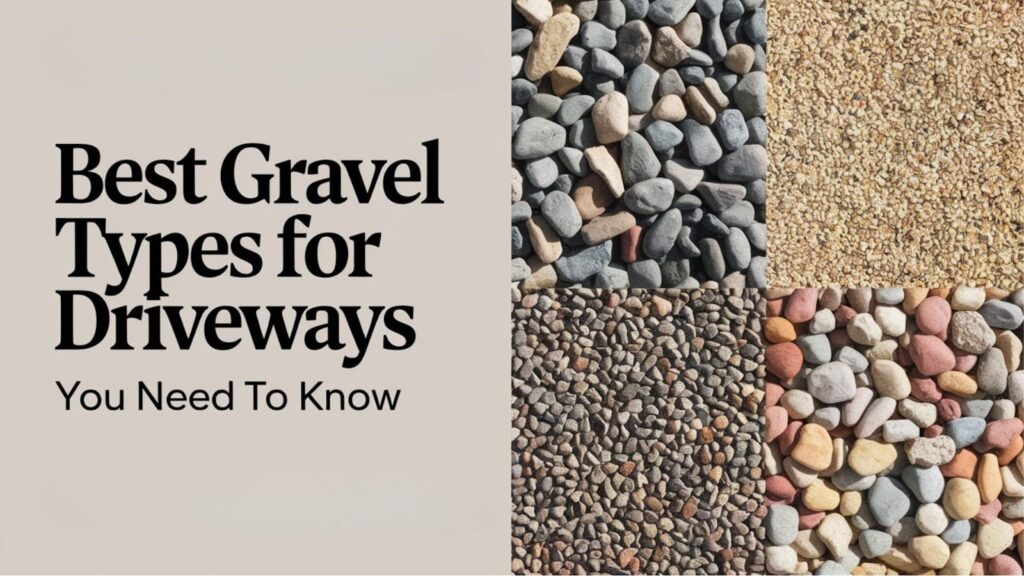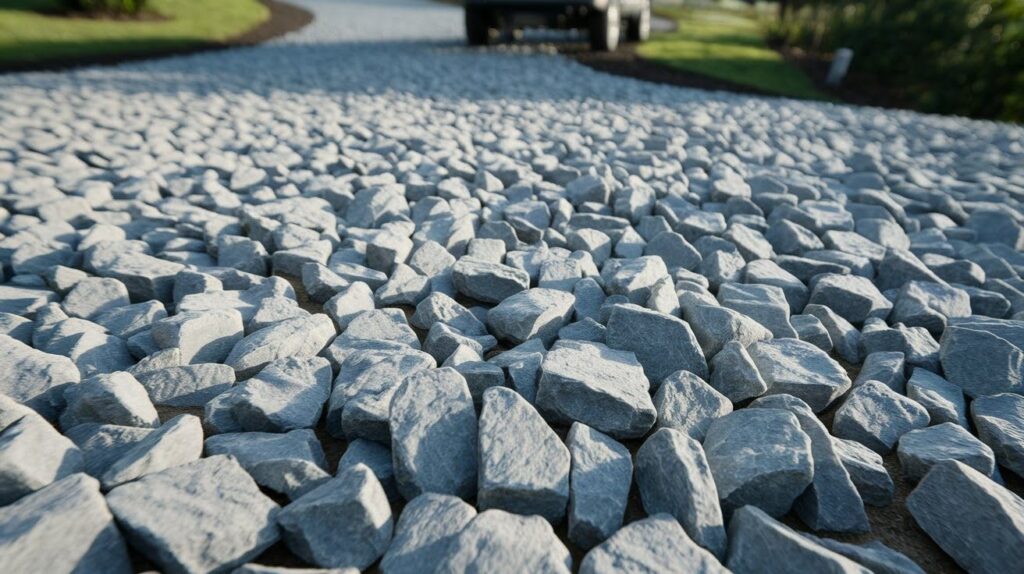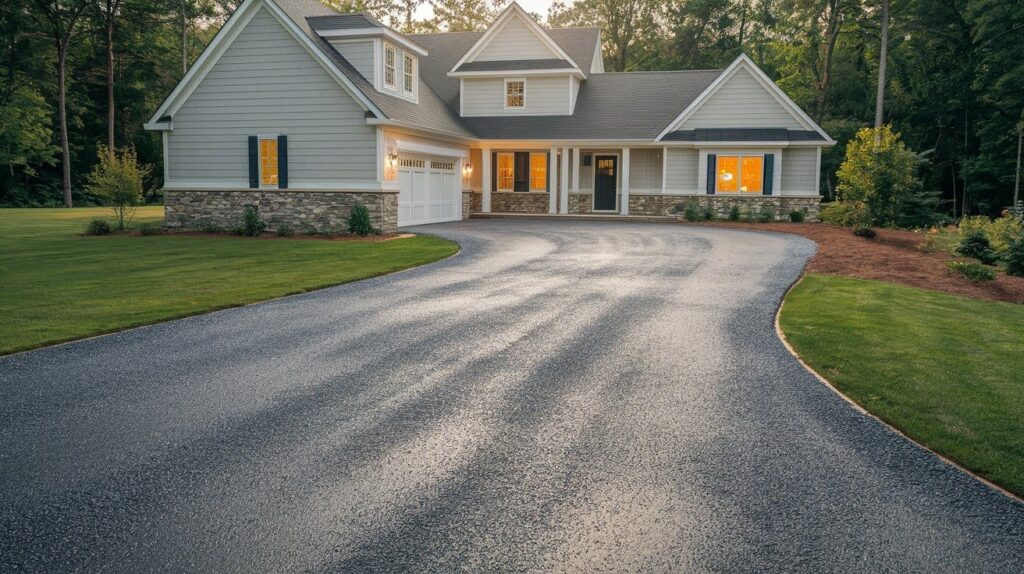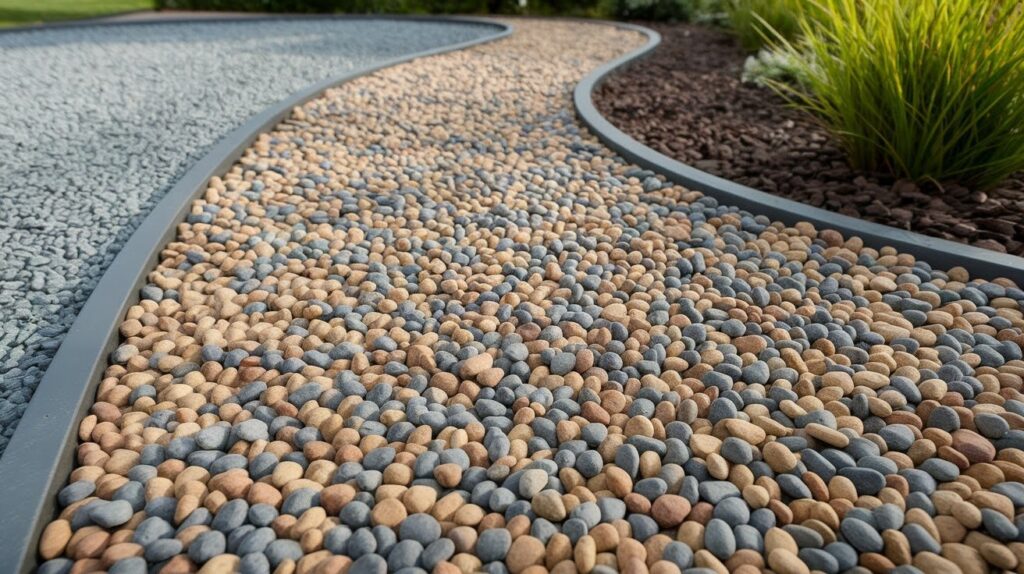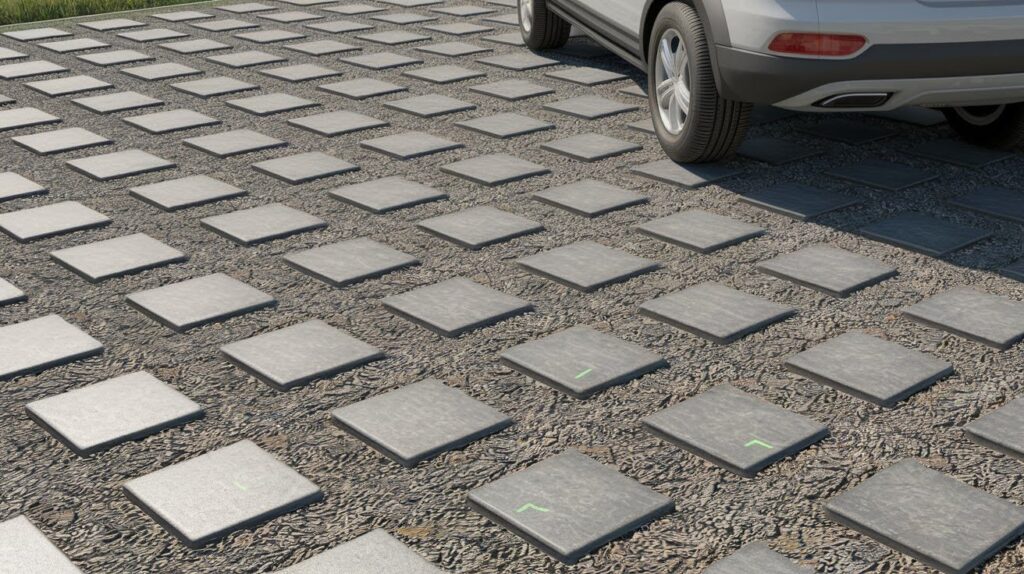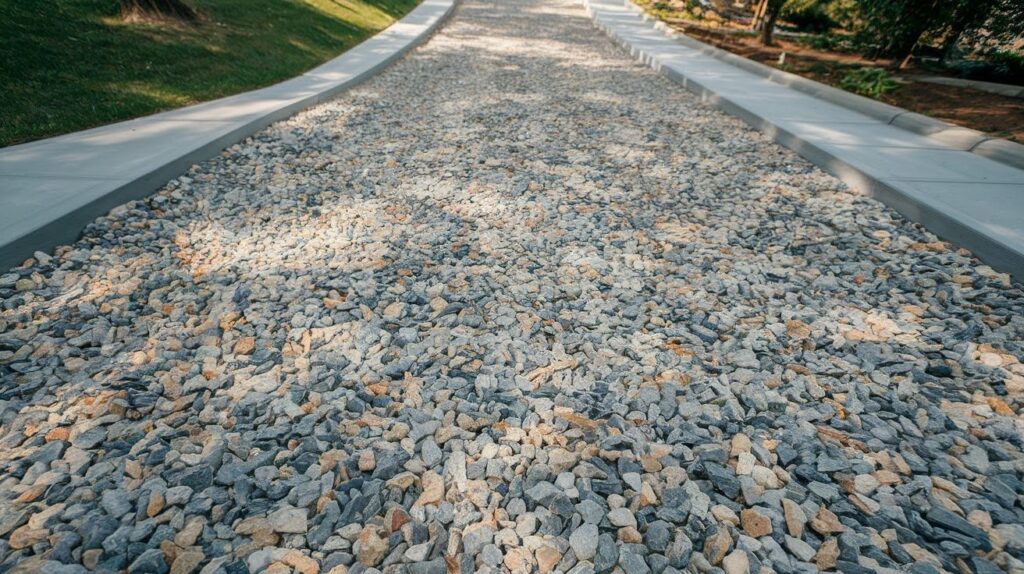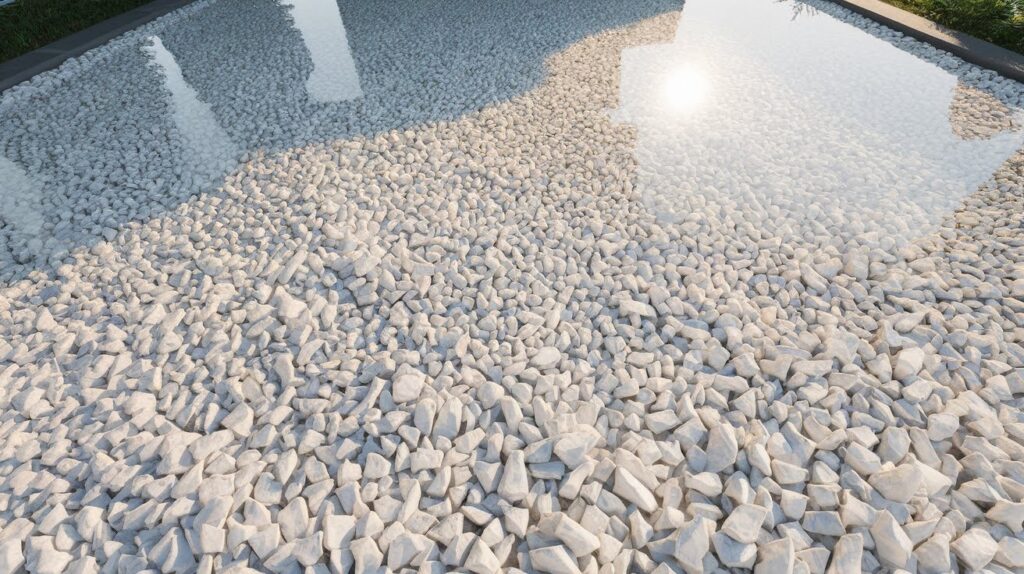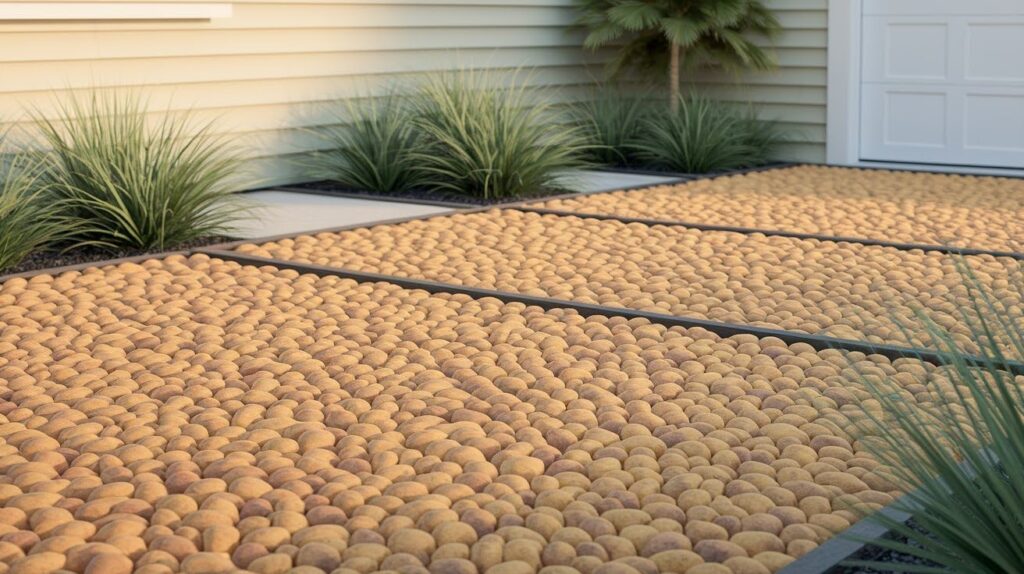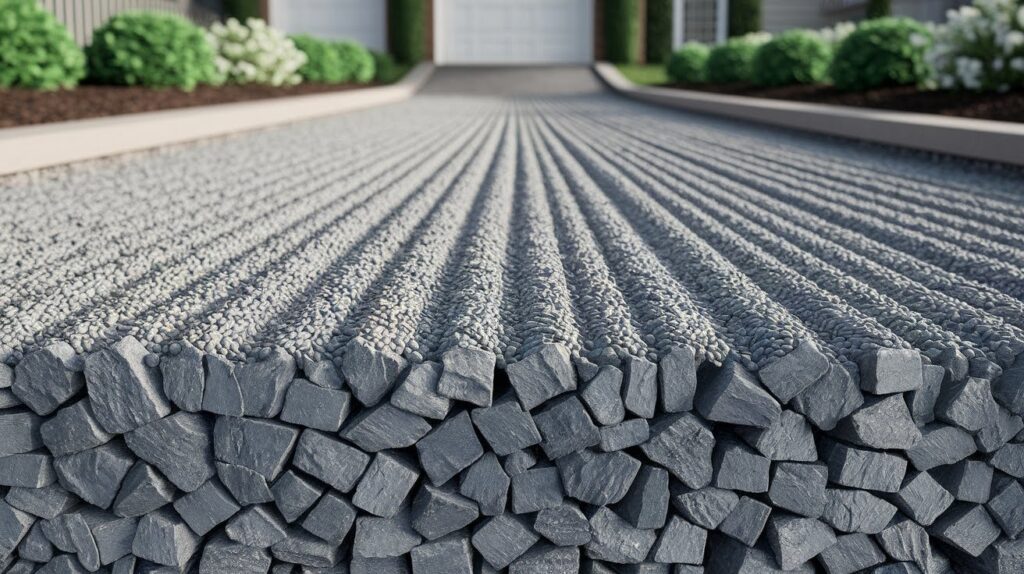Gravel driveways offer a cost-effective and durable alternative to expensive asphalt or concrete installations, providing excellent functionality at a fraction of the price.
These versatile surfaces can withstand heavy traffic while requiring minimal maintenance compared to traditional paved options.
The natural drainage properties of gravel also prevent water pooling and ice formation during harsh weather conditions.
Selecting the right gravel type depends on several critical factors including expected usage patterns, available budget, and local climate conditions.
Different gravel varieties offer unique benefits in terms of stability, appearance, and longevity, making informed selection essential for optimal performance.
This guide examines the top seven gravel types commonly used for residential and commercial driveways.
Each option presents distinct advantages and considerations, helping you make the best choice for your specific needs, soil conditions, and aesthetic preferences while ensuring long-lasting results.
List of 7 Best Gravel Types for Driveways
Seven top-performing gravel options for driveways, ranging from functional crusher run to decorative marble chips, each with unique benefits.
1. Crushed Stone #57
Overview: Crushed Stone #57 consists of angular gravel pieces typically measuring around ¾ inch in diameter. This material is commonly used as a middle or top layer in multi-layered driveway construction, providing excellent structural support and surface stability for various vehicle types.
Benefits: The angular shape of these stones creates excellent drainage due to natural spacing between pieces, preventing water accumulation and ice formation. The irregular edges lock into place better than smooth, round stones, creating a more stable driving surface. This makes Crushed Stone #57 particularly ideal for sloped or hilly driveways where traction and stability are essential concerns.
Drawbacks: Without a proper base layer, this gravel type may allow minor shifting under heavy loads or frequent traffic. The angular edges can be uncomfortable to walk on barefoot, making it less suitable for areas where pedestrian comfort is a priority.
2. Dense Grade Limestone (411 or ¾” Crusher Run)
Overview: Dense Grade Limestone combines crushed limestone pieces with stone dust, creating a mixture that compacts tightly into a smooth, solid surface. This material forms an almost pavement-like finish when properly installed and compacted with appropriate equipment.
Benefits: This gravel type offers high durability and exceptional stability when properly compacted, making it suitable for heavy vehicle traffic. It performs well on both flat and sloped driveways while remaining affordable and widely available from most suppliers.
Drawbacks: The tight compaction results in poor drainage compared to more open gravel types, potentially causing water pooling during heavy rainfall. The stone dust component can become dusty in dry weather conditions, creating mess near doors or walkways.
3. Pea Gravel
Overview: Pea gravel consists of small, smooth, rounded stones typically measuring under ½ inch in diameter. This material comes in various natural colors including gray, tan, brown, and mixed earth tones, offering aesthetic versatility for different landscape designs.
Benefits: Pea gravel provides visually appealing results with a soft, natural appearance that complements many architectural styles. The spacing between stones allows excellent drainage while remaining comfortable underfoot for pedestrian traffic.
Drawbacks: The smooth, rounded shape allows stones to shift and scatter easily without proper borders or stabilizing systems. This characteristic makes pea gravel unsuitable for steep slopes or high-traffic areas where stability is crucial.
4. Quarry Process (Crusher Run)
Overview: Quarry Process represents a carefully engineered blend of crushed stone and stone dust designed to form a semi-solid surface when properly compacted. This material creates a stable foundation that can support significant weight loads.
Benefits: This gravel type produces a strong, load-bearing surface excellent for long-term durability under regular vehicle traffic. It costs less than decorative gravel types while providing reliable performance for functional driveway applications.
Drawbacks: Quarry Process offers less decorative appeal compared to more visually polished options, focusing primarily on function over form. Proper compaction and ongoing maintenance are required to maintain optimal performance characteristics.
5. Crushed Concrete (Recycled Aggregate)
Overview: Crushed concrete is manufactured from processed, recycled concrete materials, available in sizes ranging from 1 inch pieces down to powder consistency. This sustainable option repurposes construction waste into functional driveway material.
Benefits: This environmentally friendly option provides a sustainable alternative while offering budget-friendly pricing compared to traditional stone materials. It performs well in wet climates and adapts to both flat and sloped driveway configurations.
Drawbacks: Quality can vary significantly depending on the source and processing methods used. The appearance may seem less refined or attractive compared to natural stone alternatives.
6. Marble Chips
Overview: Marble chips consist of crushed marble pieces featuring a distinctive white or off-white glossy appearance. This reflective material creates a decorative surface option that adds visual appeal to residential properties.
Benefits: Marble chips provide an elegant, high-end appearance that increases property curb appeal significantly. The material offers durability and longevity while reflecting sunlight to help keep driveway surfaces cooler during hot weather.
Drawbacks: The cost is considerably higher compared to other gravel types, making it a premium investment. The bright white color may show stains, tire marks, or debris more easily than darker alternatives.
7. Jersey Shore Gravel
Overview: Jersey Shore Gravel features rounded, smooth stones displaying warm tan, gold, and yellow tones reminiscent of coastal environments. This material is often selected for decorative coastal-style driveways that complement beach house architecture.
Benefits: The aesthetic appeal includes warm, beachy tones that create inviting outdoor spaces with excellent drainage capabilities. The smooth stones feel soft underfoot and require minimal maintenance once properly installed.
Drawbacks: The loose texture can lead to stone movement without proper edging or border installation. Over time, this material may require periodic replenishing to maintain adequate coverage and appearance.
How to Choose the Right Gravel for Your Driveway
Factors to Consider
- Traffic Load: Heavy use from multiple vehicles or commercial traffic requires compactable, angular stone materials like crusher run or dense-grade limestone that withstand repeated weight and pressure
- Climate & Drainage: Wet regions with frequent rainfall or poor soil drainage benefit from open gravel types like Crushed Stone #57 or pea gravel that allow water flow and prevent pooling
- Aesthetics: Select colors and finishes that complement your home’s architectural style and landscape design, from natural earth tones to refined appearances or practical gray options
- Budget: Recycled concrete and dense-grade materials offer affordable solutions with adequate performance for most residential applications without premium pricing
- Slope Considerations: Steep driveways require materials that lock together well, such as angular crushed stone, while flat surfaces can accommodate smoother options like pea gravel
- Maintenance Requirements: Consider long-term upkeep needs, as some materials require periodic replenishing or border maintenance to prevent shifting and spreading
- Installation Method: Factor in whether you plan professional installation or DIY approach, as some materials require specialized compaction equipment for optimal results
The Importance of a Solid Gravel Base
A proper gravel base layer prevents settling, improves stability and drainage, and extends driveway lifespan using crushed stone materials.
Why You Need a Base Layer
A properly constructed base layer serves as the foundation for any successful gravel driveway, preventing common problems that plague inadequately prepared surfaces.
Without this crucial foundation, driveways experience settling and rutting over time as vehicles compress the surface material into underlying soft soil, creating uneven areas that collect water and become increasingly difficult to navigate.
The base layer significantly improves both stability and drainage performance by creating a stable platform that distributes vehicle weight evenly across the surface area.
This enhanced stability prevents the formation of potholes and depressions while allowing proper water flow away from the driveway surface, reducing erosion and frost damage during seasonal weather changes.
Investing in a quality base layer substantially extends your driveway’s lifespan by protecting the surface material from premature wear and displacement.
This foundation prevents costly repairs and frequent maintenance while ensuring consistent performance throughout years of regular use.
Best Base Materials
Crushed stone materials like #3 stone or dense grade aggregate provide excellent foundation support due to their angular shapes that lock together when compacted.
These materials create a stable, load-bearing surface that resists movement under vehicle traffic while maintaining proper drainage characteristics.
Crusher run offers superior compactable strength by combining various stone sizes with fine particles that fill gaps between larger pieces.
This material creates an almost concrete-like foundation when properly compacted, providing maximum stability for heavy-traffic driveways while remaining cost-effective compared to paved alternatives.
Conclusion
Choosing the right gravel for your driveway depends on careful consideration of your budget constraints, landscape characteristics, and specific driveway conditions.
No single material works perfectly for every situation, making informed selection crucial for achieving optimal results that meet your functional and aesthetic requirements.
Each gravel type offers unique strengths and weaknesses that should be matched to your specific priorities.
Whether you prioritize durability, appearance, drainage, or cost-effectiveness, understanding these trade-offs helps ensure satisfaction with your investment. Consider factors like traffic load, climate conditions, and maintenance preferences when making your final decision.
For expert advice or professional installation services, request input from local gravel suppliers who understand regional conditions and material availability.
Their experience with similar projects in your area can provide valuable insights that help avoid common mistakes while ensuring proper installation techniques for long-lasting performance.
Frequently Asked Questions
What is the most affordable gravel type for driveways?
Crushed concrete (recycled aggregate) and dense grade limestone offer the most budget-friendly options for driveway construction. These materials provide adequate durability and performance while costing significantly less than decorative alternatives like marble chips.
Which gravel works best for steep driveways?
Angular materials like Crushed Stone #57 and dense grade limestone work best on slopes because their irregular edges lock together effectively. Avoid smooth, rounded options like pea gravel on steep surfaces as they tend to shift and scatter easily.
How thick should my gravel driveway be?
Most gravel driveways require 2-4 inches of surface material over a 4-6 inch compacted base layer for optimal performance. Heavy traffic areas may need additional thickness, while lighter use driveways can function well with minimum specifications.
Does gravel provide good drainage compared to asphalt?
Yes, gravel driveways offer superior drainage compared to solid surfaces like asphalt or concrete because water flows through spaces between stones. This natural permeability prevents water pooling and reduces runoff issues during heavy rainfall.
How often does gravel need replacement or maintenance?
Well-installed gravel driveways typically need minor maintenance every 2-3 years, including adding fresh material and regrading high-traffic areas. Complete replacement is rarely necessary if proper base preparation and periodic upkeep are maintained consistently.

